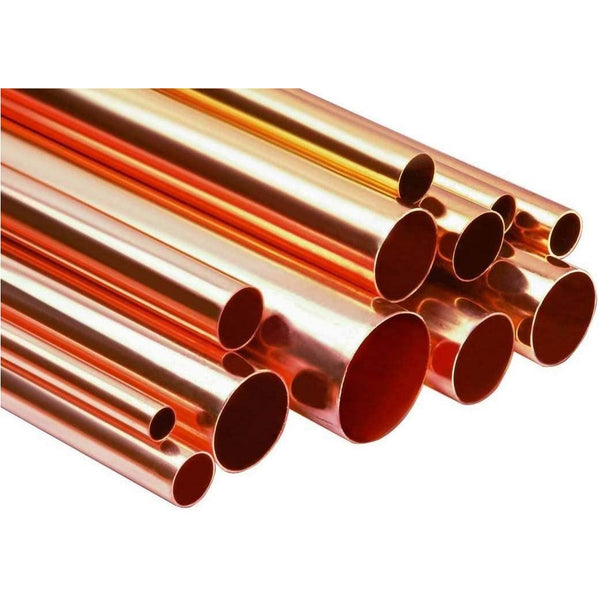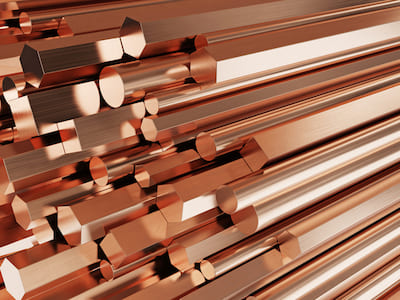Exploring the Diverse Applications of Copper Products in Modern Industries
Copper items have developed themselves as crucial elements across a myriad of modern sectors, primarily as a result of their exceptional conductivity, pliability, and resistance to rust. From enhancing the effectiveness of electrical systems to playing an essential duty in eco-friendly energy innovations, the convenience of copper appears. Its recyclability placements it as a lasting choice in production and electronics. As sectors increasingly prioritize technology and sustainability, the varied applications of copper warrant a closer evaluation, specifically concerning their possible influence on future environmental techniques and technical advancements.
Electrical Applications of Copper
Copper is a necessary material in the electrical market, accounting for around 60% of the total need for non-ferrous metals around the world - Copper Products. Its exceptional electric conductivity, which is virtually two times that of light weight aluminum, makes it the preferred choice for a large range of electric applications. From circuitry systems in household and commercial structures to high-voltage power transmission lines, copper makes certain performance and dependability in electrical energy delivery
In enhancement to circuitry, copper is important to the production of electric elements such as transformers, electric motors, and generators. These elements utilize copper's thermal conductivity and malleability, necessary for heat dissipation and reliable performance. Copper's resistance to corrosion boosts the lifespan and resilience of electrical systems, making it a cost-efficient remedy in the lengthy term.
The development of sustainable energy sources, such as solar and wind power, has better boosted the demand for copper in electric applications. As industries shift in the direction of lasting energy options, copper's duty ends up being also extra critical. Generally, the flexibility and efficiency features of copper solidify its standing as a keystone material within the electrical sector, driving innovation and efficiency across numerous applications.
Plumbing and Piping Solutions
In modern plumbing systems, the choice of products significantly influences both performance and durability. Copper has become a recommended option as a result of its distinct properties, consisting of deterioration resistance and antimicrobial features. These features ensure that copper piping remains durable and safe for carrying potable water, a crucial factor to consider in property and commercial applications.
One of the crucial advantages of copper in pipes is its ability to hold up against high temperatures and stress, making it suitable for a range of applications, from warm water systems to heating and cooling networks. Additionally, copper's flexibility permits less complicated setup in complicated piping layouts, minimizing the threat of leaks and failings.
An additional noteworthy advantage is copper's long life expectancy, usually exceeding 50 years with proper upkeep. This long life not just minimizes substitute expenses but additionally adds to lasting methods by minimizing waste. Furthermore, copper's recyclability lines up with modern-day ecological criteria, promoting a round economy within the pipes industry.
Copper in Renewable Energy
The flexibility of copper prolongs beyond pipes applications, playing a crucial duty in the renewable resource industry. Its superb electrical and thermal conductivity makes her latest blog it an essential material in the manufacturing and distribution of renewable resource sources, especially solar and wind power. In photovoltaic panels, copper is utilized in photovoltaic cells and electrical wiring, facilitating efficient power conversion and transmission. Its resistance to corrosion ensures resilient performance, which is vital for making best use of energy result with time.

Moreover, as the worldwide demand for electric cars (EVs) boosts, copper's role in battery systems and charging facilities comes to be a lot more significant. The product's capacity to carry out electrical energy effectively is integral to the efficiency of EV batteries, improving range and billing speed.
Copper's Role in Electronics
Electronic devices producing counts greatly on copper's remarkable buildings, especially its high electric conductivity and thermal efficiency. These attributes make copper a suitable option for a variety of electronic components, consisting of connectors, motherboard, and wiring. The metal's capacity to successfully transmit electric signals ensures minimal power loss, which is crucial in high-performance digital devices.
Additionally, copper's thermal conductivity plays a substantial function in heat visit the site dissipation, protecting sensitive elements from overheating. This is specifically essential in modern electronic devices, where small styles bring about increased heat generation. Copper is likewise favored for its pliability and ductility, allowing it to be conveniently shaped into intricate styles that meet the needs of innovative electronic applications.
With the increase of consumer electronic devices, telecommunications, and electric automobiles, the demand for copper in the electronic devices market continues to grow. Hence, copper stays a foundation material in the ever-expanding field of electronic devices.
Ingenious Makes Use Of in Manufacturing

One notable application is in additive production, where copper-based materials are utilized in 3D printing processes. This permits the creation of complex geometries and light-weight components, particularly in the aerospace and auto markets. In addition, copper's thermal conductivity makes it an optimal option for look at this now warmth exchangers, boosting performance in industrial cooling systems.
Additionally, the surge of wise production has actually seen the incorporation of copper in IoT gadgets, where its conductive capacities support advanced sensing technologies. In the realm of renewable resource, copper is pivotal in the production of photovoltaic panels and wind generators, promoting more efficient power conversion and distribution.
As sectors pursue sustainability and development, copper's versatility and performance remain to place it as a vital product, driving improvements in manufacturing and adding to the growth of smarter, a lot more reliable items.
Final Thought
In recap, copper items show exceptional versatility throughout various contemporary markets. Copper Products. Their remarkable conductivity enhances electrical applications, while rust resistance guarantees reliability in plumbing. The important duty of copper in renewable resource and its essential feature in electronic devices highlight its importance ahead of time lasting methods. Furthermore, innovative uses in making highlight copper's adaptability and withstanding importance. Collectively, these applications show copper's essential payment to technological progress and industrial efficiency in modern culture.
From improving the efficiency of electric systems to playing a crucial role in eco-friendly energy technologies, the convenience of copper is obvious. As industries increasingly prioritize advancement and sustainability, the varied applications of copper call for a closer evaluation, especially concerning their potential effect on future environmental methods and technical advancements.
The development of sustainable energy resources, such as solar and wind power, has even more enhanced the need for copper in electrical applications. On the whole, the convenience and efficiency characteristics of copper solidify its status as a foundation material within the electric sector, driving technology and efficiency throughout numerous applications.
The versatility of copper extends past plumbing applications, playing an important duty in the eco-friendly power sector.